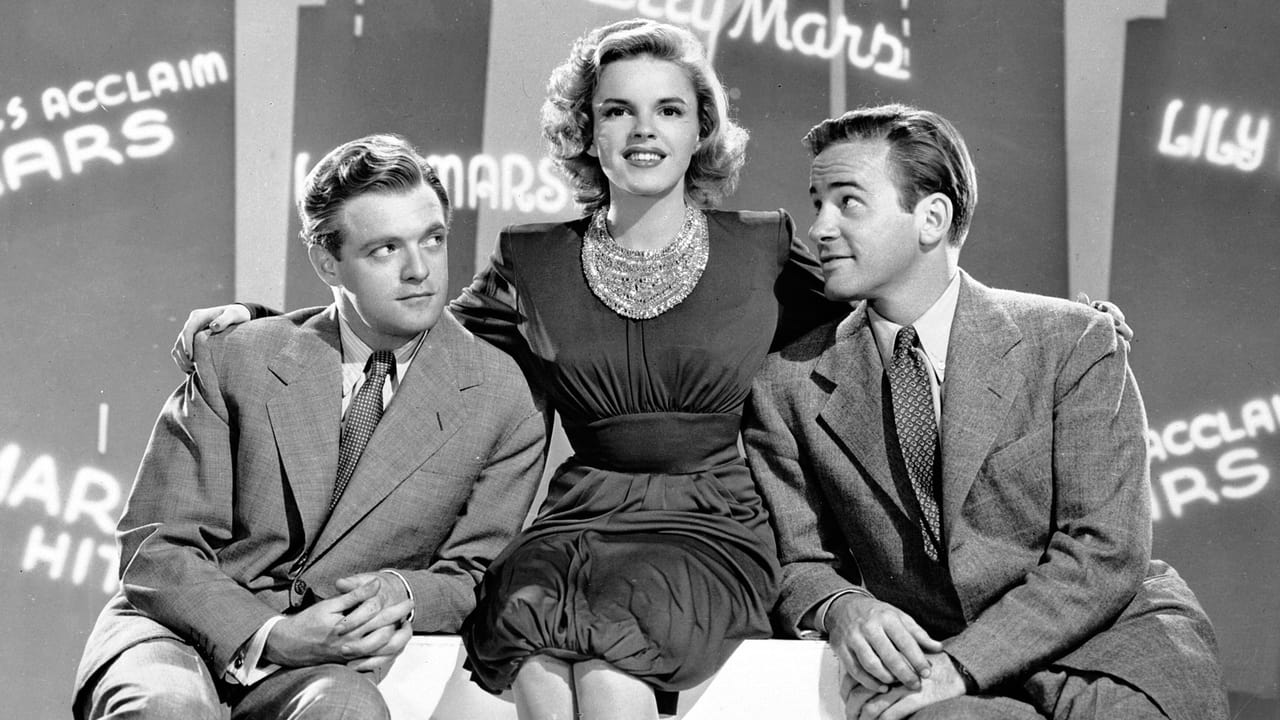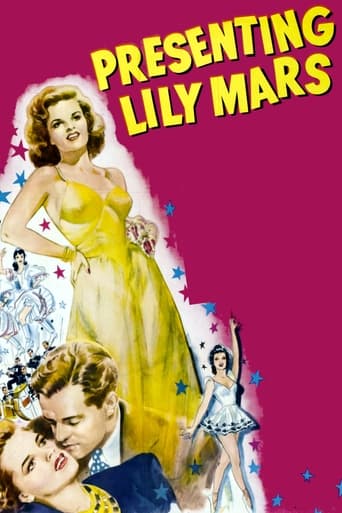Scanialara
You won't be disappointed!
Lucybespro
It is a performances centric movie
Matylda Swan
It is a whirlwind of delight --- attractive actors, stunning couture, spectacular sets and outrageous parties.
Guillelmina
The film's masterful storytelling did its job. The message was clear. No need to overdo.
TheLittleSongbird
Despite how that review summary might sound, 'Presenting Lily Mars' is not an awful, or even a bad film. There's actually still a good deal to like about it, but at the same time it does have some big flaws and just falls short of Judy Garland's best films.There is nothing to complain about Judy Garland herself. In fact she is the best thing about 'Presenting Lily Mars' and her terrific performance is the reason to see it in the first place. She proves herself to be not just a sincerely touching presence but also quite the adept comedienne, handling the comedic and dramatic elements with aplomb. She looks wonderful, looking healthy and happy, and as always her voice is of the kind that one can listen to for hours and not get tired of it.Garland's not the only reason to see 'Presenting Lily Mars' this said. The film is very nicely photographed and the costumes and sets not one hundred percent opulence but still very elegant. The music and songs are above serviceable and often very good, if with few timeless standards. Faring best are "Every Little Movement" and "When I Think of You". The numbers are staged with enough grace and energy though with nothing standing out as enough to make one go wow.'Presenting Lily Mars' supporting cast fare well too. Connie Gilchrist and Richard Carlson are particularly delightful, and both Spring Byington and Fay Bainter make much of roles that don't give them much. Tommy Dorsey and his Orchestra are always great value and come off very well here.Martha Eggerth didn't seem to fit, for operatic fans they may be able to tolerate her but if not she is going to be a form annoyance, am actually a huge fan of opera/operetta, but do feel Eggerth's singing and performing of the little seen of her has not gelled on film. There are far more appealing voices in the same or similar style than hers and the very broad way she plays the role grates. Also didn't really care for Van Heflin, his role to me ideally should have had a lighter and more sophisticated touch and Heflin seemed too boorishly heavy, stiff and charmless.His unconvincing chemistry with Garland is one of 'Presenting Lily Mars' biggest problems, there isn't much of any but it's more of the fault of how the romance is written in the film itself. The romance is just too forced and too rushed, and because the hostility is so strong in the early scenes and the transition from hostility to love happens suddenly rather than gradual or a more complex love/hate one never really believes it when they fall in love.One will argue that the story and script rarely is a strong suit in musicals, and that musicals aren't seen for them. In a way that is true, but it is all dependent on how well everything else is done and while people do judge films for what they are they also judge them for being a film full-stop. Even for the early 40s the story is non-existently lightweight and stale, and the distastefully corny and excessively cutesy writing makes the worst of the writing for the Garland/Mickey Rooney back-yard musicals (mostly enjoyable films but the writing was a weak link in at least two of those) more bearable. Then there is the finale that, even with the dynamic presence of Garland and Tommy Dorsey and his Orchestra, is an overblown tacky afterthought and is just at odds with the rest of the film.In summary, Judy herself personifies glamour but 'Presenting Lily Mars' as an overall film only has it in spurts. 5/10 Bethany Cox
rspencer-909-101250
A certain 30s sensibility through much of this, with Spring Byington reprising her role in You Can't Take It with You (sort of). Judy is always worthwhile, but Van Heflin is awful, just awful. His sudden transition from cranky genius to love-struck schoolboy is sudden and unconvincing, and his range of expression is paper-thin. Also, why director Taurog thought he needed to subject his audience to so much of Eggerth's ridiculous "singing" and "acting" is beyond me. Finally as another reviewer says, the finale is tacked on and not particularly interesting. Judy could have used a more engaging co-star (like one with actual talent!), but she's often funny, and when they let her swing in the musical numbers, she leaves you wishing for more.
bkoganbing
Presenting Lily Mars may have provided Judy Garland with one of the easier roles she had while at MGM because Lily Mars is definitely a character she could identify with. A young girl with talent enough for ten, she knows she has what it takes to make it in the theater no matter how much producer Van Heflin from her home town discourages her.I really liked Judy in this one as the girl determined to make it in the theater. Because it is Judy Garland with the talent of Judy Garland you in the audience know she has the right stuff even if it takes Van Heflin nearly the whole movie to be convinced.Both Judy and Heflin hail from the same small town, Heflin's dad was the town doctor who delivered her and Heflin while he may have moved away and become a big producer on Broadway, their respective moms, Fay Bainter and Spring Byington have kept in touch. That's her entrée, but Heflin's constantly barraged with stagestruck kids, but never anyone quite like Lily Mars.No real big song hits came out of Presenting Lily Mars for Garland, though she sings all her numbers. The best in the film is a revival of that gaslight era chestnut, Every Little Movement Has A Meaning All Its Own. Judy sings it with Connie Gilchrist playing the cleaning lady in a Broadway theater where Heflin's show is being produced. Gilchrist was a star back in the days of the FloraDora Girls and she and Judy deliver the song in grand style with Connie. It's the best scene in the film as Gilchrist encourages Judy to keep at it. Composer Karl Hoschna had died a long time ago, but lyricist Otto Harbach was still alive and I'm betting he liked what he heard.European musical star Marta Eggerth is in Presenting Lily Mars as the show's star who's at first bemused, then angry and finally, understanding of Garland and Heflin. She did a couple of films with MGM and then went back to Europe for more work on the continent. I'm betting MGM didn't quite know what to do with her and her thick Hungarian accent, though Louis B. Mayer never met a soprano he didn't like.Van Heflin does well as the patient producer who puts up with a lot from Garland and Eggerth. Heflin was just coming off his Oscar for Johnny Eager the previous year and he and Garland wouldn't appear to be an ideal screen team, but they're not bad together.Presenting Lily Mars is a fine showcase for the talents of Judy Garland. And she didn't have to share the screen in another backstage film with Mickey Rooney.
bmacv
This long fizzle of a backstage comedy/romance doesn't number among Judy Garland's more congenial vehicles (nor, for that matter, Van Heflin's). It can't make up its mind whether to milk wartime audiences with sentimental hometown horseplay or dazzle them with the foots and spots of the great white way, and ends up doing justice to neither. Stale old tropes and gags, dating from Busby Berkeley musicals a decade old and Mickey Rooney vehicles like the Andy Hardy series and The Human Comedy, get passed around without the slightest attempt to crisp them up. Worst of all, the song and dance numbers get doled out parsimoniously (a blessing in disguise, since they're insipid and rarely do Garland justice). Norman Taurog's Presenting Lily Mars presents a pastiche of the second-rate.Garland's Lily Mars is a small-town Indiana girl intoxicated by the smell of the greasepaint and the roar of the crowd. When a neighbor's Broadway-producer son (Heflin) blows into town, she pulls a string of Lucy-Ricardoish stunts to get discovered. With the blessing of her mother (Spring Byington), she thumbs her way to New York and wedges herself into Heflin's life. (Heflin's mother is Fay Bainter, making this Hoosier town a world capital of sugary supermoms.) But once in The Big Apple, the problem proves to be Heflin's girlfriend, charmless Martha Eggerth. She's the temperamental and heavily-accented star of his big hit, an utterly dreadful Ruritanian folly, lousy with bad ballet and crummy coloratura, that's foisted off as fun. The movie's almost a break-a-leg story but pulls up lame, because Garland must learn patience and earn her stardom. But second thoughts from MGM's executive suite must have prevailed, because after the point where Booth Tarkington's story logically ends, with Garland humbly delivering the equivalent of a `dinner is served' line, Judy/Lily gives a couple of encores in the style of her daughter Liza/Francine's Happy Endings lollapalooza in New York, New York. Luckily for Garland, she would soon catch the eye of a director (and husband) who would appreciate and showcase her gifts (and her maturity) in movies like Meet Me in Saint Louis and The Clock, leaving behind forever juvenilia like Presenting Lily Mars.

